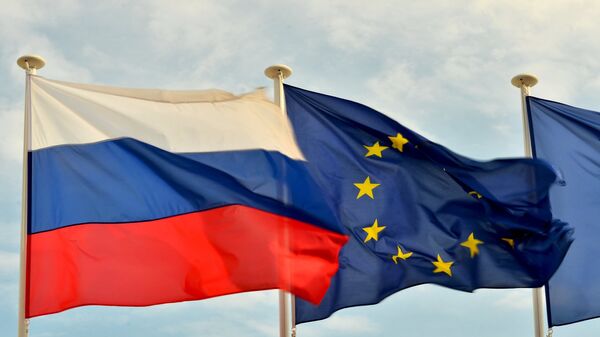On Thursday, EU leaders agreed to prolong their anti-Russia sanctions another six months, until July of 2018. The sanctions otherwise would have expired on January 31, 2018. The EU has imposed sanctions against Russia in response to Crimea's reunification with Russia, as well as the ongoing conflict in Eastern Ukraine.
"Inherited policies inevitably get locked into place, they just continue by virtue of inertia. There is a lack of vision right now in the West, a lack of any alternative to a policy of confrontation with Russia. Over time, sanctions become less and less meaningful, because workarounds come into play. The sanctions just aren't that important, except for their political capital," Professor Petro told Radio Sputnik.
Sputnik: So it's just all that much easier to continue prolonging them?
Nicolai Petro: That's right. There comes a time, especially as sanctions continue in place, when the most important thing is the perception of not appearing to cave in, and the actual cost of the sanctions becomes less important.
Sputnik: No one single EU country can really do anything to finally change the situation — I mean Berlin would never change the EU sanctions policy against Russia by itself, would it?
Nicolai Petro: No, because it assumed the role of the emblematic leader of the European Union. It is possible, theoretically, for any one of the EU nations to impose a veto. A number of countries have spoken of this. But the question of solidarity comes into play and various economic pressures; countries can be bought off to preserve that political unity. I see no overwhelming pressure or urge to change the current status quo. The current status quo is the new reality and is the normal relationship that exists now between the EU and Russia, and I would proceed from that.
Sputnik: Where do you go from there?
Nicolai Petro: You continue. When have politicians, in your memory, ever changed a policy simply because it was wrong?
Sputnik: Not even under internal pressure, inside their own country?
Nicolai Petro: All pressures in politics are met by countervailing pressures. You cannot answer that question by focusing only on one set of pressures; you have to see what the mix of pressures is. It's quite apparent that the mix of pressures currently still yields a result in favor of sanctions.
Sputnik: Do you believe that the European Union will lift sanctions against Russia in any foreseeable future, and if it should happen, what would it require, what kind of impetus?
Nicolai Petro: I do not believe there is any prospect of lifting the sanctions and if I were in the Russian government, I would assume that opportunities for deepening relations with the West are limited. Opportunities to improve relations with the West expand when Russia is simply too strong to be ignored, and Syria is a good example of that.
The views and opinions expressed by Nicolai Petro are those of the professor and do not necessarily reflect Sputnik's position.




